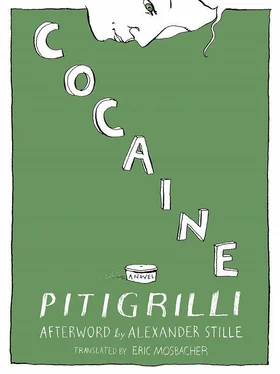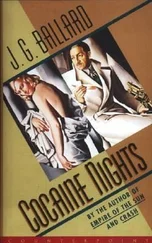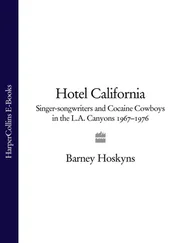And the patrol disappeared.
To Tito Cocaine had looked more beautiful and more desirable than ever before. But her renewed beauty gave him pain, not pleasure, for he felt that if he was to be her last lover there would be a long time to wait until its destruction was complete. Cocaine saw herself as ugly and felt old, but she was not yet old or ugly enough to be unable to please. Tito could not yet hope for the pleasure of being the last.
There was to be another reception for her next day at the home of the head of the custom house, she had accepted an invitation to the British consulate on Thursday, and on Saturday she was expected at the villa of a rich native merchant. In that colony of Europeans tired of odorous, wild black female flesh Maud’s Nordic perfume would still rouse some interests. Tito was sure that the renunciatory intentions she had just expressed would vanish at the first smile of some European libertine.
That was what Tito felt. But Cocaine, her will broken and in a state of nervous exhaustion, was like an inert mass that could be molded by any strong will.
“You said you’d be ready to die,” Tito murmured. “You said you felt finished, that you no longer had anything to look forward to. I too am a walking corpse. I too have nothing to look forward to but death. If I asked you to die with me tonight, would you agree?”
Cocaine stopped for a moment. A star flashed across the horizon. The woman suddenly turned as if she had been touched by something; Tito’s eyes were shining as they did when he was under the influence of the white drug that the one-legged peddler sold him in that café in Montmartre.
“Would you be willing to die?”
“Yes.”
“With me?”
“Yes.”
“Straight away?”
“Yes.”
“Well, I offer you the most beautiful, the most exciting death in the world. Very soon the fastest train in West Africa will be passing on this track. It has been traveling for days and days and will be traveling for many more, and it travels blindly, without seeing where it’s going or what it crushes or sweeps out of its path. The crew go to sleep over the brakes and they go on and on in a straight line day and night.”
“Do you want it to run you over?”
“Yes.”
“But Tito, don’t you see that you’re not talking like an inhabitant of this world, that you’re talking like a character in a novel? You’re beside yourself.”
“Yes. Being carried away, being beside oneself, is a hand held out to us by destiny, a shove that it gives us when our will is insufficient. The African night, your voice, your perspiration, all that carries me away; and your discouragement, your disillusionment with life encourages me to die. Think how exciting it will be to lie down on this endless track with our cheeks against the cold steel, to feel for the last time our bodies clinging to each other, trembling with fear. Every light we think we see in the distance, every noise we think we hear will give us a tremor as long as eternity. And in our last embrace, which will be the most exciting in our lives, we shall hear the clatter of the train and see its shadow approaching, we shall shrink like beaten dogs, but the black monster will be on us, crushing us and mixing our blood for ever. Remember that neither you nor I have anything more to hope for from life. We’re tired. We’re as good as dead already. Come, let me kiss you for the last time.”
And Tito, passionately uttering these words, put his arms round Maud, who had nearly fainted, and forced her to kneel, then sit, then lie on the ground. The sky was a perfect concave; you could see its completely circular edge as you can out at sea. Cocaine was pale; her brow was wet with perspiration and her eyes marvelously dilated as if she could see above her the face of death.
It was the face of Tito who was lying on top of her, frenziedly kissing her mouth, her throat, her eyes. Under her back the endless rail extended like a blade. It hurt, because all her weight was on it, as well as Tito’s weight on top of her.
“Cocaine,” Tito groaned without ceasing to kiss her cheeks and bite her lips. “Cocaine, these are the last minutes. Tell me again you love me.”
“I love you,” she moaned with the voice of one who is dying.
“I want you,” Tito hoarsely exclaimed, stifling her with the pressure of his mouth on hers and holding her in his arms as if to crush her to death, “I want you. I want to die taking you for the last time. I want to be your last lover.”
“Yes,” she cried. “Take me.”
With trembling hands Tito tore off her light clothing, and when she was completely naked he started frantically kissing her whole body, her breast, her eyes, her armpits, tearing out hairs with his teeth and sucking the perspiring flesh that bled as a result of his bites.
“Take me,” she cried again.
For a moment the two bodies were one. She saw Tito’s bloodshot, panting face on her own face, framed by stars and the blue sky; she felt herself being crushed between the hard steel rail and the weight of the panting man who was putting the ardor of a whole lifetime and the frenzy of all his passion into this last experience.
The man who was about to die suffered as he had never suffered before, because this was the last time.
She was vibrant as she had never been before, because she had never experienced this sensation more wonderful than death.
His face was a single contraction of muscles and was covered with foam, his eyes shone like enamel and his rhythm was as violent as if he were transfixing her with a knife.
Suddenly he began slowly groaning, and stopped. The contractions ceased, his brow became smooth, his eyes lost that terrifying light, and all his muscles relaxed. His cruel arms slackened their grip, and he rose to his feet.
Cocaine was still lying in the same position. There was nothing shameless in her motionless nudity in the immensity of the night under the purity of the stars.
But her lover, her last lover, looked southward, and saw a black shadow drawing nearer on the shining rails.
He picked up the naked woman and laid her on the dry grass a few yards away from the track.
The Great West Africa Express appeared and thundered past, and the huge draft caused pieces of torn mauve lingerie decorated with small organdy pleats to rise and flutter in the air.
Cocaine opened her eyes and watched the black, puffing trail of lights speeding through the night and disappearing, leaving the endless steel railway track behind it.
The train crushed even its own sparks.
Tito, without speaking, helped Maud to dress and pin together her torn clothing, and they walked back to the town and the hotel.
They kissed once more at the door of her room.
Next afternoon, while Maud was drinking a melted banana ice at another reception in her honor, Tito embarked in a ship leaving for Genoa. Just when the propellers started to sing their melancholy and gay farewell ballad, Tito put his hand in his pocket and found a visiting card.
Who’s he? he said to himself. Where did I come across this chap?
Then he remembered.
He was the European who had sung the praises of Berber women soon after his arrival and had told him he had several available, the oldest of whom was sixteen.
Tito looked again at the visiting card and smiled.
If I’d taken advantage of his offer, my suicidal intentions would have disappeared, he said to himself. Even on this occasion my jealousy was the product of long abstinence, of accumulated desire.
He remembered that on the way back to the hotel with Cocaine on the previous night he had felt much calmer after possessing her on the railway line. It had occurred to him that she might well give herself to someone else next day, but the thought did not make him suffer.
Читать дальше



